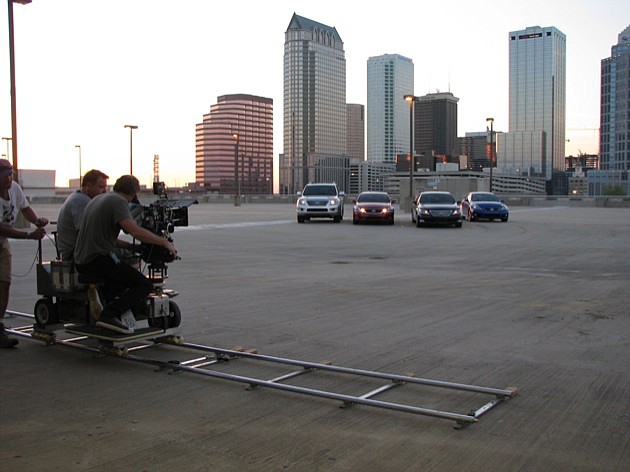- July 26, 2024
-
-
Loading

Loading

Billboards showing a knife sticking in a bleeding orange are a bit of a sore spot for people working within Tampa's film and video industry.
The giant ads are for a new television program called “The Glades,” a fictional, comical crime show set in South Florida about a retired police detective who gets called in on murder cases when all he really wants to do is play golf. The show premiered July 11 on the A&E cable channel.
Trouble is, “The Glades” was originally set in the Tampa Bay area. In fact, much of the pilot episode was filmed locally before Fox Television Studios decided to relocate production to Broward County, where USA Network's popular series “Burn Notice” has been based the last three years.
Now the locals want to make sure they don't get burned anymore, especially after the Florida Legislature approved $242 million in tax credits for film production. The credits, which apply to state sales tax and corporate income tax, are a more solid alternative to cash refunds and won't burden an already strapped general budget.
So now that Florida appears to have solved the financial aspect of luring more showbiz, it is up to individual markets to try for their share. Tampa Bay is already kicking its effort into a higher gear, promoting the area's own aspects as a suitable location for making movies and TV shows, far removed from the South Beach glitz.
“Tampa is not Miami — we get that,” says Lindsey Guthrie, manager of the Tampa Bay Film Commission. “The same people who are looking at South Florida aren't the same ones who would be looking at the Tampa Bay area.”
Various public sites, private properties and industrial warehouses have been used for decades to shoot and edit film over the last 25 years, with features ranging from “Cocoon” in 1985 to “The Punisher” in 2004. Everybody seems happy after the wrap — Hollywood producers get the right scenery and local businesses receive some favorable economic impact, along with a few autographed pictures for restaurant walls.
But that didn't seem to work out as well for “The Glades.” The producers' original plan to do one filming day for the pilot ended up taking nearly a week in December, while local residents kept looking for ways to capitalize on the project.
“A lot of things didn't go smoothly with that production, on both sides,” Guthrie says. “We did everything we could to keep these people here. It just didn't work out.”
Rather than dwell on the sour experience, Guthrie says the local film industry is learning from it. For example, improved cooperation between filmmakers and property owners will make things go more smoothly the next time a movie or TV project lands here, she says.
The state tax credit will also help: “This incentive will be a tremendous marketing tool for us,” Guthrie says. She adds that the Tampa Bay Film Commission has received plenty of inquiries from film producers over the last several years, but weak incentives always made closing the deal difficult.
The commission may already be able to claim its first win under the new tax breaks. Work on a privately funded feature film called “Mad Scientist U” is set to begin this fall, with local producers and writers working on what is billed as a science-fiction comedy.
“If it wasn't for the new film incentive program, we were planning on shooting this film somewhere else,” says Tony Armer, one of its producers. “We've been working on this project for over four years now, so we're very excited to not only be shooting the film but doing so right here in our backyard.”
Instead of waiting for those projects to come along, the film commission is grabbing its fair share of commercial work. Carmakers such as Lexus, Volkswagen and Volvo have used Tampa as the backdrop in its ads, and baseball cap maker New Era spent a day in March shooting a national spot featuring Rays third baseman Evan Longoria.
Commercial and other film work generated a modest $4.3 million in local economic impact for Hillsborough County last fiscal year, Guthrie says. She points out that those projects are consistent even if they are short lived, but something longer term would be nice, too.
“Certainly we would love to be home to a television series or a feature film,” she says. “We have in the past and would love to again.”
As of now, seven projects planned for the Tampa Bay area have applied for state incentives — four documentaries, two feature films and a TV series.